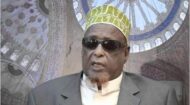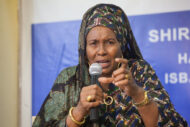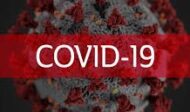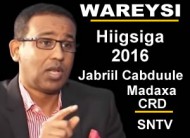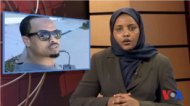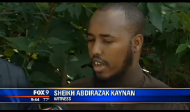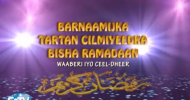

A Somali convert from Islam to Christianity, Haile has dedicated his life to sharing the peace and good news of Jesus Christ with his people.
He completed 15 years of service with Eastern Mennonite Missions in Kenya in 2009.
“Ahmed’s impact on Somalia and the Muslim world is profound and cannot be measured,” said David W. Shenk, Haile’s longtime friend and co-worker in Somali ministries.
Born in Bulo Burti (Dusty Village) in central Somalia, Haile was the son of settled nomads. When he was 17, the Sudan Interior Mission hospital in his home town saved Haile from almost certain death from cerebral malaria.
The Bible stories he read during his recovery gripped his heart. He was fascinated to discover new dimensions to stories he’d first read in the Quran.
“When I was memorizing the Quran as a young boy, the imam told me that Jesus did miracles,” he said. “That made me curious about Jesus. As I read the Bible I found that Jesus fulfilled the questions and spiritual yearnings I had as a Muslim.”
Haile became part of an emerging Somali believers’ fellowship that grew up around the Sudan Interior Mission and EMM schools and hospitals. Eventually he made his way to Kenya and the U.S., where he graduated from Western Mennonite High School in Salem, Ore., Goshen (Ind.) College, Indiana State University and Associated Mennonite Biblical Seminary in Elkhart, Ind.
Missionary doctor Marc Erickson, who now leads Eastbrook Church in Milwaukee, discipled Haile as a young believer in Somalia. Friendships like this continued to focus Haile’s passion on the Somali people, even as the country plunged into anarchy.
Haile also met and married his wife, Martha, at Eastbrook Church.
A hub for friendships
After several stints in Somalia and a second near-death experience when he lost his right leg in a rocket attack, in 1994 the Hailes accepted EMM’s invitation to teach and develop a Peace Studies curriculum at Daystar University, a Christian school in Nairobi, Kenya.
The Hailes’ home became a hub for Somali friendships.
A steady stream of Somalis — many refugees from their deteriorating homeland — stopped for a cup of sweet, cardamom-laced Somali tea. In the midst of their open home, the Hailes parented three children, Afrah, Sofia and Gedi. Martha Haile taught church history at Daystar, while Ahmed Haile focused on peace studies and Islam.
“Families need a community to belong to,” Martha Haile said. “I loved hearing the joyous voices of the children as part of the mix in our Nairobi home.”
Ahmed Haile experienced the birth of the modern Somali church when the first believers were baptized in 1965.
“No matter what happens there, we must not forget Somalia,” he said.
Other highlights of their time in East Africa included several retreats for Somali believers who came from more than a dozen countries. One such gathering included at least one person from each Somali clan.
“Something happened we had never witnessed before,” Haile said. “Persons representing each clan confessed their sins of hostility toward the other clans, and then prayed for forgiveness and reconciliation.”
At one gathering, Somali believers asked forgiveness from EMM representatives for the killing of Merlin Grove, an EMM worker who was stabbed to death in 1962 while registering students for English classes in Mogadishu.
“Heaven was touching Earth as we shared in that marvelous gathering,” Haile said.
No fear of death
Although religious freedom exists in Kenya, sharing the gospel is not without risks. Haile frequently committed his life into God’s hands, remembering how God had raised him up from near death at least twice before.
“If my calling to be an ambassador of the gospel of reconciliation results in death, I am ready to accept that for the sake of Christ,” he said. “I am captivated by the redemptive suffering love of Jesus on the cross. So death carries no fear for me.”
In the summer of 2009 when the Haile family left Nairobi for the U.S., they faced a different kind of threat — a cancer diagnosis for Haile.
But during the past year, even as he faced severe health challenges, the Hailes took time to minister to Somali communities in the United States.
In April they traveled to Kenya and Djibouti to say goodbye to the Somali fellowship and bring closure to their 15 years in East Africa.
Not knowing how long he has to live, Haile has focused on writing his memoirs, calling on the help of David W. Shenk.
“It has been the highest privilege of our lives to help tell this wonderful story,” Shenk said after he and his wife, Grace, completed a week’s worth of interviews with the Hailes.
Haile wants his testimony for Christ to continue among Muslims and the Somali people.
“I will never speak critically of Islam, because Islam prepared me to believe in Jesus Christ,” he said.
Haile’s memoir, My Name Is Ahmed: Ambassador of Peace within the World of Islam, is scheduled for release by Herald Press next summer.

 All Posts
All Posts

